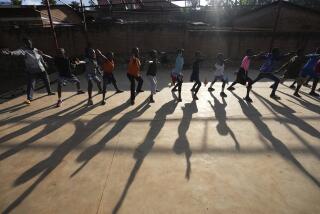Shameful Inaction in Face of Genocide
Ten years ago Tuesday, the Rwandan genocide -- the most concentrated slaughter of human beings in our generation -- began.
During 100 days in 1994, an estimated 800,000 women, children and men, mostly ethnic Tutsis, were massacred. These murders were instigated by Rwandan government, military and media leaders and carried out by thousands of machete-wielding Hutus. Resurgent massacres plagued the countryside for years thereafter.
The United States failed in 1994 to respond effectively to the genocide that engulfed Rwanda. For those of us in the policy rooms at the time (I was the senior counsel to the U.S. ambassador to the United Nations), the sickening memory of our timidity and detachment from the horror will never be extinguished. We owe the victims and their families our souls every day. What happened?
We responded conventionally to an extraordinarily unconventional crisis, thus failing to reverse the tide of killings at the earliest stages. In early 1994 and for several weeks into the genocidal rampage, U.S. policymakers focused almost exclusively on the long-festering civil war in Rwanda and how to implement the Arusha peace accords of the previous year. All efforts turned to salvaging those accords -- and only later on to body counts.
A better understanding of the region would have shown us that the ethnic violence in Burundi during the fall of 1993, which resulted in the slaughter of an estimated 50,000 Tutsi and Hutu civilians, could trigger further violence next door. The international community’s collective detachment from the murderous reality unfolding in Burundi sent a strong signal to the extremist Hutus in Rwanda that the shooting gallery was open, free of charge.
A shameful moment in my own experience occurred when I told a group of congressional staffers -- shortly after the killing of 18 U.S. soldiers in Somalia in October 1993 had paralyzed Washington -- that our muted reaction to the massacres in Burundi demonstrated our reasoned approach to peacekeeping. We were not going to rush into every humanitarian catastrophe, I confidently reported at that briefing.
Other warning signs of the impending catastrophe met with conventional responses. Reports of arms caches, political killings and smaller, recurrent ethnic massacres in early 1994 were factored into a comfortable political calculus often divorced from the reality. The favored option, chosen in vain, was to persuade political leaders to implement the peace accords.
We now know that violent humanitarian calamities may require unorthodox responses, speedy and innovative policymaking and determined efforts to focus political will on the imperative of human survival. Atrocities do not wait for well-briefed discussions. Atrocities, imminent or launched, scream out for immediate and imaginative actions tailored to the unique threat. Timing is everything.
For the U.S., a good starting point would be to attend not only to its national interests but to its global interests, and to work harder to strengthen the capacities of the United Nations.
In the early days of the Rwandan genocide, foreign governments took immediate action to evacuate their nationals and ill-equipped U.N. peacekeepers. That single conventional objective preoccupied policymakers here, abroad and at the United Nations to the exclusion of all else, and it allowed the murderers to operate freely. The critical step of beginning immediate planning for effective military and police intervention was delayed and obfuscated for so long that it became useless.
Reliable information about atrocities can arrive from unofficial sources, particularly human-rights and relief groups and the media. Policymakers, however, too often remain wedded to intelligence information (and the lack of it) to shape their views. I deeply regret underestimating the importance of the April 1994 report of the International Committee of the Red Cross alerting us to more than 100,000 murders in Rwanda. That was the critical moment when the alarm bells should have rung to take forceful action.
The State Department’s failure to invoke the word “genocide” publicly to describe what was happening until it was almost over left deep scars. It is imperative for the U.S. to acknowledge when crimes against humanity or ethnic cleansing or other war crimes are occurring and, if the emerging facts warrant, that at least indicators of genocide exist.
We must not allow the legal requirements of determining what genocide is to keep us from identifying crimes that are killing tens of thousands of innocent civilians -- and from then reacting decisively with all we’ve got.
More to Read
Sign up for Essential California
The most important California stories and recommendations in your inbox every morning.
You may occasionally receive promotional content from the Los Angeles Times.










